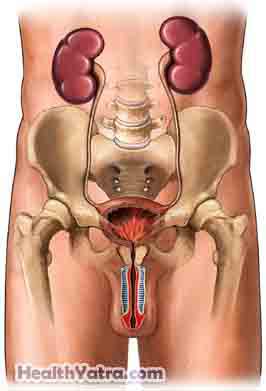Definition
Reiter’s syndrome is an inflammatory reaction to an infection somewhere in the body. It usually follows an infection of the urinary, genital, or digestive tract. It is treated with rest and medication.
Causes
Reiter’s syndrome is triggered by certain infections. It is usually caused by the bacterium that causes chlamydia. Chlamydia is transmitted through sexual contact with an infected partner. The infection can also begin in the digestive system. In these cases, the infection occurs after eating food tainted with bacteria.
Risk Factors
Factors that increase your risk of getting Reiter’s syndrome include:
- Family members with Reiter’s syndrome
- Inheriting the genetic trait associated with Reiter’s syndrome (HLA-B27)
- Having a chlamydia infection or an infection in the digestive system
Symptoms
Symptoms occur in the joints, the eyes, the urinary tract, and genitals. Men and women may experience different symptoms. In rare cases, heart problems may develop later in the disease.
In the Joints:
- Swelling, pain, and redness, especially in the knees, ankles, and feet
- Heel pain
- Back pain and stiffness
In the Eyes:
- Redness
- Burning
- Irritation
- Blurred vision
- Tearing
- Discharge
In the Urinary Tract and Reproductive System
In men:
- Burning sensation when passing urine
- Penile discharge

In women:
- Burning sensation when passing urine
- Inflamed vagina and cervix
Other Symptoms Include:
- Rash, especially on the palms or soles
- Ulcers in the mouth or on the tongue
- Weight loss
- Poor appetite
- Fatigue
- Fever
Diagnosis
Your doctor will ask about your symptoms and medical history. A physical exam will be done. Your doctor uses these findings to help make the diagnosis. There is no specific test to check for Reiter’s syndrome.
Your doctor may need to test your bodily fluids and tissues. This can be done with:
- Blood tests
- Culture, gram stain, or other tests
- Removal of fluid from the affected joints
Your doctor may need pictures of your bodily structures. This can be done with X-rays.
Treatment
There is no cure for Reiter’s syndrome. Most patients recover from the initial episode within 12 months. But some develop mild, chronic arthritis. Some patients suffer from additional episodes of the disorder.
Treatment aims to relieve symptoms and may include:
Rest
Short-term rest to take the strain off the joints.
Protecting the Joints
This includes:
- Assistive devices as recommended by your doctor
- Occupational therapy to learn how to take it easy on joints during daily activities
Medications
Your doctor may prescribe some of the following:
- Nonsteroidal anti-inflammatory drugs (NSAIDs) such as naproxen or ibuprofen
- Sulfasalazine
- Steroid injections into the inflamed joint
- Topical steroid creams applied to skin lesions
- In some cases, antibiotics to treat the triggering infection
- Medication that suppresses the immune system
- Eye drops
Prevention
To reduce your chances of getting Reiter’s syndrome, take these steps:
- Always use a latex condom during sexual activity
- Have a monogamous relationship
- Do not go back and forth between sexual partners
- Have regular checkups for STDs
- Wash hands before eating or handling food
- Only eat foods that have been stored and prepared properly
